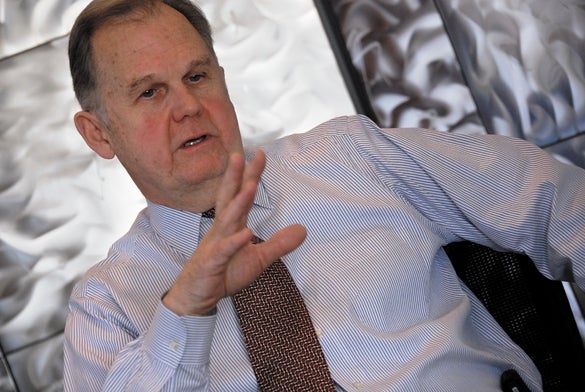You might call him the anti-serial entrepreneur.
While some business-minded scientists were turning idea after idea into embryonic companies in the hope that they might be acquired by some industry giant, since 1987 Gregory J. Yurek has been plugging away at a high-tech company that stayed stubbornly unprofitable for two decades.
In the fourth quarter of 2008, Devens-based American Superconductor turned a profit for the first time. In the 21 years leading up to that event, the company transformed from a kitchen-table startup focused on the science-fiction-tinged prospects of superconducting cables to a multi-national corporation known mostly for making components for wind turbines. And Yurek himself went from being an MIT professor studying corrosion of metals at high speeds to a CEO with employees in four continents.
Theory In Practice
In reality, Yurek, the 2011 Worcester Business Journal Big Business Leader of the Year, was never the stereotypical scientist with more interest in lab work than the world around him. Over his 12 years as an MIT professor with a focus on chemical metallurgy, he said, he commonly received evaluations from students complaining that he was “too practical” and “not theoretical enough.”
Then, around the start of 1987, he happened to hear something about the concept of ceramic superconductors. He remembers envisioning applications like magnetically levitated trains traveling at hundreds of miles per hour and thinking, “This is going to change the world.”
Yurek began looking into how ceramic superconductors could be made into bendable wires. His wife, an MBA who had started two local retail businesses, suggested he consider turning the concept into a business.
In September 1987, he hired his first employees and left MIT. “I decided this is where my heart really was,” he said. The company went public in 1991. Today, it employs more than 700 people, including 24 individuals with post-doctoral degrees.
Yurek acknowledges that if he’d known just how long it would take the superconductor field to mature, he might have done things differently. As it was, though, the absence of certain products in the market that would have been compatible with superconductors pushed the company in new directions. He began looking for ways to produce new types of power elements, which led into work with renewable energy.
John B. Howe, who was a vice president at American Superconductor before going on to become public affairs director for FloDesign Wind Turbine Corp. in Waltham, said Yurek’s success came from being both tenacious and flexible.
“He’s been impatient in pursuit of a commercial goal that is one that people recognized would take many years to accomplish,” Howe said. “But he’s also been very adaptable.”
Breath Of Fresh Air
Over the years, American Superconductor made five acquisitions, the most significant being the 2007 buyout of Austrian wind power company WindTec.
“That got us very much into the wind business,” Yurek said.
In fact, these days wind power is the vast majority of what the company does. Its power systems business, which focuses almost entirely on wind turbine components, has provided 97 percent of its revenues in recent quarters. For the most recent fiscal year, which ended March 31, 2010, the company reported $16.2 million in profits.
These days, the company is very much in the Chinese wind business in particular. By far its largest client is the Chinese company Sinovel Wind Co. Ltd., and its own Chinese operation employs about 270 people.
Yurek said doing business in China has become easier over the years. He said he first started looking into working with China in 1993, but soon realized it would be complicated.
“They asked us if we would speak with President Clinton and ask him if he would stop worrying so much about human rights,” he said.
American Superconductor finally started working in China in 2006, when the political climate had become less charged.
Yurek said 90 percent of the company’s business is now outside the United States, something that allowed it to continue growing during the U.S. recession.
While it also does business in South Korea, India and other nations, “China’s clearly the driver here,” Yurek said.
The company is sometimes criticized for being too dependent on Sinovel, but Yurek said the issue is not so much that it does too little business elsewhere as that it does so much business in China.
“Sinovel just keeps giving us big orders,” he said.
Cross-Cultural Efforts
Yurek said it’s easy to underestimate how important communication with employees is in leading a company — and that’s as true in China as it is in America.
When American Superconductor first opened a plant in China, he said, they weren’t sure what employees there would be excited about. “We’ve learned over time. It’s training.”
He said even low-level employees want to learn how to do more and different tasks. And, he said, the employee culture is entrepreneurial. Workers quickly embraced the notion of stock options.
Despite all the focus on wind power, Yurek said, American Superconductor isn’t about to walk away from its name. He said superconductors are just starting to come into their own to support new uses, including a power grid that can accommodate electric cars and huge isolated wind farms.
He expects the company’s superconductor business to eventually be bigger than its wind business is now.
Meanwhile, Yurek said one of his greatest accomplishments is that despite the pressures of his job, he’s maintained a good partnership with his wife all these years and raised two boys with her. They’re now 28 and 31.
“They’re just really great human beings,” he said.
On the professional side, Yurek sometimes still talks to serial entrepreneurs. He tries to impress upon them the notion that developing a good idea sometimes takes a whole generation. But he said keeping on task through the ups and downs hasn’t been a slog for him.
“Every day has been different and exciting,” he said. “I think that’s why I stuck with it all this time.”

